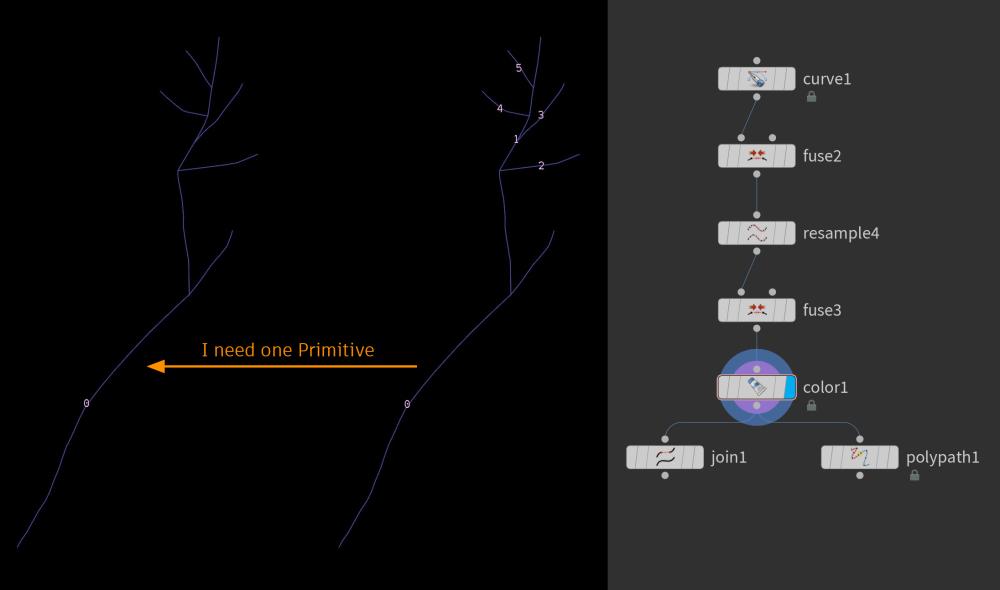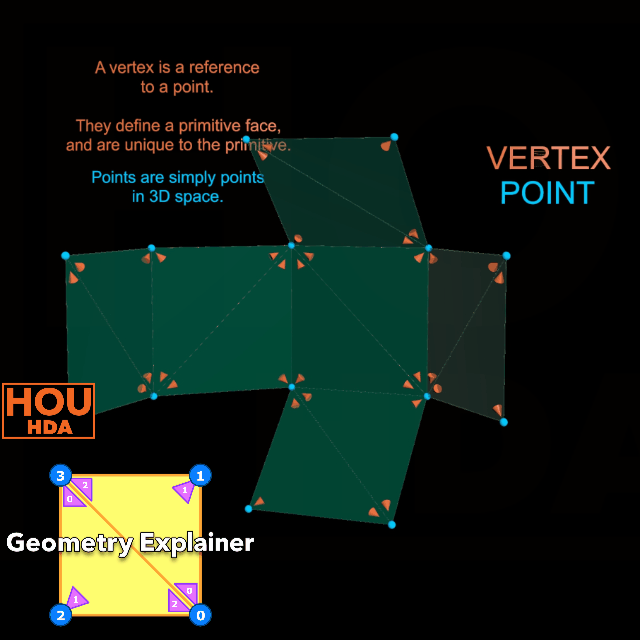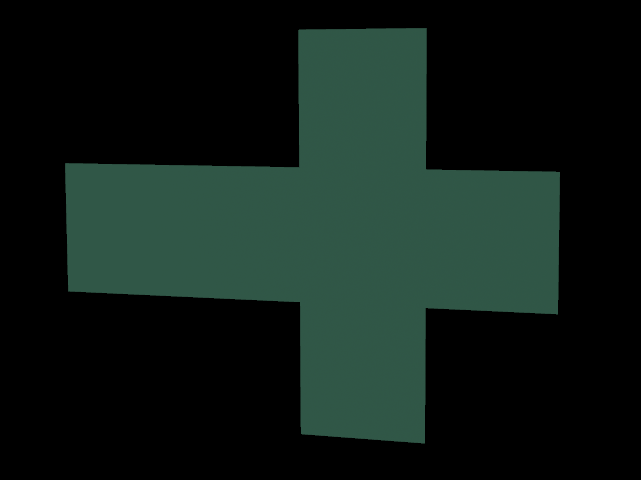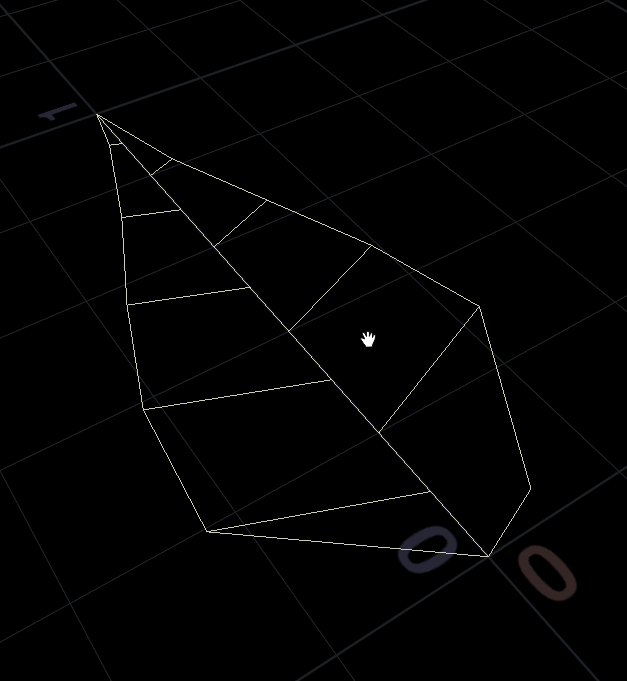Search the Community
Showing results for tags 'PRIMITIVE'.
-
Hi everyone, I'm trying to find the closest point on a primitive that's near a specific location, and then create a new point at that position. I’d appreciate any ideas to fix my codes. Thanks for helping. Add Point to Prim.hip
-
FFX Geometry Explainer is an assistive HDA for Educators, and DIY learners. As a beginner, have you struggled with understanding how Vertex, Point, Primitive, Detail, UV Seam, Edges, Half-Edges, Normals, Normal winding, and Shared/Unshared points relate in Houdini? This HDA should help. https://davidtorno.gumroad.com/l/geometryexplainer For Educators, there is an unlocked option, so you can dive into the tool build and customize it to your specific needs if you like. For learners, there's a cheaper basic version that is locked, but has all the same learning info.
-
- 1
-

-
- explainer
- educational
- (and 13 more)
-
Hi all, I have a single poly prim with 1+polys ontop/inside, I would like to remove the smaller ones from the larger one (think bool) ideally not using a bool operation (but may be unavoidable) and using VEX, my current approach would be to extract to points and knowing the small prims figure out a way to rebuild a prim from these . (easy right ?) and suggestion welcome. Curt
-
Hi I'm fairly new to Houdini, hoping someone can help me understand how to do this. Basically I want to rotate the triangles with a noise in an attribute VOP, however nothing I have tried works and I have a feeling it's because rotation may only work on point normals? (Still pretty confused) I tried using the primitive node to rotate but would ideally like to be able to control random rotation in VOPS Any help would be really appreciated, it's been quite frustrating to figure this out Thanks rotatetriangles.hip
-
Hi, I'm trying to solve an interesting task in Houdini while I learn more about VEX and just ran into a situation where I'm not finding an answer anywhere. So, I created a voronoi sphere and then added center points on each "piece" (face) of the voronoi cells. What i'm trying to do next is to create new primitives using each center point created on the previous step. I figured out how to do that by manually adding each vertex in the code using the addvertex function but it would be a time consuming task and it would kill the procedural process. Also, I noticed that as I start creating each face by entering the center point numbers on the code, some point numbers get shuffled resulting in a wrong face sequence and winding. Attached are some images showing what I got resolved so far. That said, how can I create new primitives using the voronoi center points? I tried sorting the point order and then creating a primid that could later be used in the add sop to create new prims but because there was no primitive connecting the new center points, the resulting primid was -1. Just for reference, I tried using this code and it resulted in the negative primid: int ptorder[] = primpoints(0, @ptnum); i@sort = find(ptorder, @ptnum); i@primid = @primnum I see that there are potential functions that could help in this case like nearpoints but i'm not sure how to sort the points correctly so each primitive could be created correctly or if it even helps. Any thoughts on this would be appreciated.
-
I have a resampled line and I'm gonna delete some points on that, why removepoint does not remove primitive anymore in houdini 19?
- 3 replies
-
- vex
- removepoint
-
(and 2 more)
Tagged with:
-
i am using python to create a file SOP assign a path and import a bgeo file. After that i am creating some more nodes in my graph and i need a primitive name attribute from that bgeo. From primitive 0 prim = filenode.prim(0) #get first primitive of node filenode name = prim.attribValue("name") #get primitive attribute name This throws an error ----> AttributeError: 'SopNode' object has no attribute 'prim' Is it possible to read the attribute?
-
Hi All, I'm trying to do 2 things but I think they are about the same. 1) trying to subdivide or better copy a bunch of cubes to form the following pattern: I would like then to turn it into a glue rdb afterward. But first I need to get to this.. I tried to follow 2 different tutorials, Peter Quin discovery title sequence and SideFX own lego type boxelizer. But I think I need to get an hybrid between the 2. I think that my problem is that I need to group each copy and use it as new boundary or something like that. 2) Based on the same idea, I would like to try to get the cube to be divided like this (here is a sliced view). And again I would like to turn it into an rdb object later on. I attached my first attempt. I'm trying first to apply a random color to each primitive, but for whatever reason, it's applied to each faces... not the entire cube... I know I'm doing something wrong. There are 2 "primitive" SOP in the scene, they are doing the same thing, I was just trying to see if I could color them using the stamp expression (before the copy SOP), or after... Any help, suggestion, comment, ihint or random string of words woul dbe greatly appreciate. Thanks. bil random_cubeDivision.hipnc
- 9 replies
-
- 1
-

-
- subdivision
- modeling
-
(and 1 more)
Tagged with:
-
I've been told how to create a primitive in a previous post. Creating a primitive - General Houdini Questions - od|forum (odforce.net) Now I want to know if I can set up custom parameters for my primitive? I want it to have similar parameters that the scales in the video below have. 08_RepTile_Scale_Test_01_InitialTest.mp4
-
How can I create a primitive in Houdini? This is a cylinder in Maya and I want to create a primitive just like that with parameters.
-
I very much enjoy the convenience of the "Alembic Group" node and would like to bring that to an FBX (File node) pipeline. Alembic Group's hierarchy selection seems to be based on a writeable string primitive intrinsic called "abcobjectpath." When importing an FBX using a File node, it comes with path attributes that can be used with Alembic Group but ONLY if I can somehow copy them as a prim intrinsic called "abcobjectpath." Is there any way of creating an arbitrary prim intrinsic out of nothing?
-
Thought I'd share a little primitive center rotation snippet, any comments welcome. Note: Requires connectivity node upstream set to primitive and attrib "class". //Rotate primitive around center and defined axis int points[] = primpoints(0, @primnum); vector axis = set(0,1,0); //define user axis //vector axis = normalize(@N); //if normal axis is required float angle = ch('angle'); matrix3 rotm = ident(); rotate(rotm, radians(angle), axis); //get center (requires connectivity node, set primitime and sttrib "class") string grp = '\@class='+itoa(i@class); vector CenterPivot = getbbox_center(0,grp); vector pos; // move points to origin, rotate, move back foreach(int pt; points) { pos = point(0,"P",pt); pos -= CenterPivot; pos *= rotm; pos += CenterPivot; setpointattrib(0,"P",pt,pos, "set"); }
-
Hey all- I have a simulation running that is controlling the position and orientation of a grid that comprises just a single square polygon. Trying to use python to output the normal and center point of that grid. I can access the first hou.Prim, but I can't figure out how to get the polygon to get the normal. How do I do that? Thanks! Dave
-
Hello I'm doing a RBD (bullet) sim with custom concave geo (proxies) that I pack my self using assemble. I use a scatter and copy to points to set up my inital state, run the sim. I use a dopimport, and I would like to fetch the hi rez geo. Tutorials show that if I had the high rez geo scattered the same way I could plug it and it would work straight away. However I would like, with only my points, to retrieve the high rez geo. I thought I would use a foreach and apply primintrinsics or transformpieces or even a copytopoints as seen in some tutorials like here but nothign works, my scales and pivots don't seem to work. To give you an idea of what my network looks like before the dopnet: I cross posted on Sidefx forums but it wasn't published sorry for the crosspost. If you have any info on this I'm very interested.
-
i am trying to run over named primitives, but the for each loop seems to pick randomly for each iteration which batch to process. i want the loop to respect the sorted primitives and run over each named primitive as it is in the geometry spreadsheet. How does it pick the first batch for iteration number 0? can i change that? image 1 is before the loop,sorted primitives image 2 is inside the loop with a single pass to see iteration 0 As you can see the first batch the loop chooses to process is not the first batch as sorted before. First batch should be the one named color_229_229_0
-
Hi, I'm Edmund and I'm beginner on Houdini. I'm trying to procedural road and block for city. Is there any way to making primitive by using closed curve or something?(attached)
- 1 reply
-
- road
- procedural
-
(and 2 more)
Tagged with:
-
Hi there, Lets say we have a bunch of packed primitives scattered in an area on the left side and a on the right side a geometry, like frustum. I want to detect all the packed primitives that even a small portion of their bounding box is intersecting with the geometry. I have one method of doing this but its not ideal, I was wondering if anyone knows an efficient and preferably with vex way to do this. Cheers, C
-
Hi guys, how can I edit the pivot to match a specific surface primitive or normal? I need to transform the arm of my robot in a specific way, so my pivot needs to be edited to match the surface normal. I already tried to edit it with " and ' but this only allows to move it but not to rotate it :/ Roboter.hiplc
-
Hi all Im having a big confusion about packed primitive. Lets say I have an animated and packed sphere. when I check in primitive intrinsic It is having the packfulltransform info, But if I convert it to polygons and pack it again then the packfulltransform info gets ident matrix and no animating values but still the mesh is animating. My question is where does houdini stores the transform info after the animated mesh is packed. I hope it is some what clear. packFullTransform.hip
- 4 replies
-
- packed primitive
- primitive itrinsic
-
(and 3 more)
Tagged with:
-
I have three individual components to this briefcase, the body, the handle rings and the handle, the body is a static objects and the other two are RBD packed objects, all concave. I am trying to get the handle to hang from the suitcase naturally but they are falling through each other, there is a slight reaction but i cant get them to completely react to each other. I have attached a zip of the three .obj files and the .hip file if anybody could have a look. Any help would be really appreciated ! Thanks! Assets.zip
-
Hello, I am trying to assign a material to packed disk primitive. This was already asked here many times but still I am not sure about my current situation I have geometry with two groups, I want to assign two materials based on those groups. However geometry is quite heavy so it makes sense to load it as packed disk primitive so that viewport is fast and ifd small. This geo is part of a digital asset, digital asset contains shop network with those shaders. So I need a way to assign material using relative path. I tried it but unfortunately it doesn't seem to work. With absolute path it works as expected. I also do not want to unpack the geo inside asset, because then I would loose packed disk prim advantages. One solution would be to save it with absolute path and put shaders always inside /shop/... But if I could make relative material path assignment working, it would make my scenes cleaner as everything related to the asset is included inside the digital asset. Thanks, Juraj




















